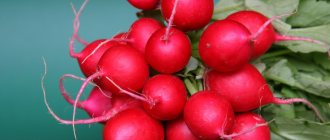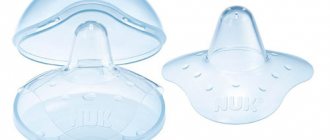Is it possible to include tomatoes in the diet during breastfeeding?
When a nursing mother eats tomatoes, which contain a lot of acids, the baby’s mucous membranes are irritated, infants develop allergies, the tummy swells, and suffers from colic. Not all babies have a negative reaction to tomatoes, but in the first days after the birth of a newborn, it is better for a woman not to take risks.
Gradually, while breastfeeding, the mother can begin to try a slice of fresh tomato, and if a rash does not appear on the baby’s body, the child does not twist his legs from pain due to colic, you should not refuse to eat tomatoes.
When can a nursing mother eat tomatoes?
Is it possible to eat tomatoes while breastfeeding and when is the best time to start doing so? Doctors advise not to rush to use the product after delivery and 1-2 months later. The optimal age for a baby at which eating tomatoes will not harm the health of the mother and baby during breastfeeding is 3-4 months.
It is important to start eating tomatoes gradually. On the first day, it is not advisable to eat more than one slice, and after eating, record the baby’s reaction. If his digestion remains the same and no symptoms of allergies or bloating appear, the portion of the vegetable can be increased the next day. So, the answer to the question whether a nursing mother can eat tomatoes is yes. But in what quantity is it allowed to consume your favorite product? The daily dose cannot be more than three fruits, which in terms of freshly squeezed juice is one glass.
Need to know! Supermarkets and markets sell a variety of varieties of tomatoes, ranging from yellow to pink, bright red and brown. Can nursing mothers eat red tomatoes? If the baby has a calm allergic history, this is allowed, but it is better to start with yellow vegetables; they rarely provoke a skin rash and intestinal disorders.
Useful components of the product
Tomatoes are rich in fiber, which improves intestinal motility, and amino acids involved in the formation of antibodies that protect the body from infection. Lycopene, which is present in significant quantities in tomatoes, functions as an antioxidant:
- Prevents the proliferation of malignant cells.
- Normalizes lipid metabolism.
- Fights free radicals that cause disease.
- Suppresses pathogenic microflora in the intestines.
- Fights germs and fungi.
There are a lot of vitamins in tomatoes, A helps restore nails and hair, K is responsible for bone formation and kidney function. Tocopherol calms nerves and reduces blood pressure.
Ascorbic acid strengthens the immune system, which in women is significantly weakened during pregnancy.
Nature has rewarded tomatoes with microelements in the form of:
- gland;
- magnesium;
- potassium;
- phosphorus;
- zinc
Serotonin helps mothers get rid of depression and improves their mood. Ripe fruits contain a lot of carotene, which restores the skin and has a positive effect on the heart.
How to choose a quality product: 3 buying rules
1 It is better to buy vegetables in season. Tomatoes grown in industrial premises in winter or spring contain nitrates, which are truly dangerous not only for children, but also for adults. Those. greenhouse vegetables are not suitable for nursing mothers ; the ideal option is fruits from your own garden.
You need to pick a tomato from the bush when it is already fully ripe. Leaving green fruit to ripen in a box or under the sun on a windowsill increases the risk of allergies.
2 It is better to buy tomatoes locally , i.e. those grown in the area where you live. Foreign tomatoes, brought from afar and retaining their presentable appearance, also contain dangerous chemicals.
3 Local and seasonal vegetables also need to be approached selectively. Natural tomatoes have a delicious aroma and elastic surface.
You can find out whether there are nitrates in tomatoes by touching them and examining their appearance.
Heat treatment reduces the vitamin value, but improves the absorption of lycopene.
Tomatoes with nitrates have:
- thick, dense peel;
- uneven color of the pulp in the cut and white veins;
- such a vegetable has virtually no odor;
- the surface of the tomato is very shiny, which indicates that the tomato has been treated with paraffin to preserve its presentation.
You should also refuse tomatoes with damaged skins and rotten ones . Bacteria immediately accumulate in these areas.
Eating unwashed fruits that contain a layer of dust and chemicals increases the risk of developing allergies.
From what month can you eat tomatoes?
Lycopene, which has a lot of beneficial properties, is also a pigment that colors fruits. The bright color of tomatoes means that after eating them there is a risk of allergies.
Not only in the first month, but also in the third month after the birth of the baby, such vegetables are contraindicated for nursing mothers. The baby's intestines are not able to digest them, and the body is most prone to allergies.
When a woman can eat tomatoes depends on the individual characteristics of the child, but up to three months it is better to avoid them.
Selection and storage
The healthiest and safest vegetables are those that many people grow in their gardens in the summer. Therefore, if the feeding period occurs in winter, then you can freeze them in advance in sealed bags, so they will retain their beneficial properties.
Important!
In winter, it is advisable to avoid eating tomatoes altogether, because those tomatoes that are sold in supermarkets at this time of year are grown with the help of various chemical additives, which is dangerous not only for children, but also for adults.
When consuming tomatoes during breastfeeding, you should pay attention to some features
:
- absence of an allergic reaction to tomatoes in the mother;
- eating only seasonal vegetables, since in most cases allergic reactions can be caused by a high concentration of nitrates in the vegetable;
- tomatoes are best consumed without preservatives and give preference to fresh vegetables rather than pickled or salted ones;
- moderation in eating tomatoes, i.e. during breastfeeding, it will be enough for the mother to eat 2-3 tomatoes or drink a glass of natural tomato juice;
- You should introduce tomatoes into your diet gradually, no earlier than 3 months of age, observing the child’s reaction to the new product.
Thus, with the right choice and consumption, as well as the absence of allergies, tomatoes will definitely benefit nursing mothers and their babies.
In what form can you eat during breastfeeding?
If the slice of tomato that the mother tried did not cause an allergy in the baby, and colic did not torment the baby, the woman can gradually increase the consumption rate, but within reason. Tomatoes cannot be eaten in kilograms; 2 fruits are enough.
Fresh
The most organic acids and vitamins are present in ripe tomatoes, recently picked from a bush in a country house or garden. It is best to eat fresh fruits in a salad with sour cream or sunflower oil. However, a nursing mother should avoid tomatoes grown in greenhouses in winter, since due to excessive amounts of fertilizers, the vegetables accumulate pesticides.
Yellow
Classic tomatoes have a lot of lycopene, while black tomatoes have anthocyanin. Both components are pigments and often cause allergies. Yellow fruits contain less coloring matter. It is better for nursing mothers to consume fresh tomatoes of the same color; they also contain a lot of organic acids, minerals and vitamins.
Stewed
Light and tasty dishes are prepared from tomatoes that can be consumed without fear of allergies in the baby during lactation. Tomatoes are blanched in boiling water, peeled, and cut into cubes. Sweet peppers, potatoes and onions are crushed, as well as zucchini, from which the seeds are extracted and the skin is removed. All vegetables are placed in a pan with sunflower oil and filled with water. The dish is stewed on the stove for about 20 minutes, then seasoned with herbs and salt.
With this treatment, lycopene disappears, which provokes the development of allergies.
Pickled and salted
When tomatoes are fried, they lose both vitamins and minerals. Canned vegetables negatively affect the functioning of the baby's intestines and can provoke dysbacteriosis. Pickled tomatoes contain a lot of spices and vinegar, which is harmful for both the mother and the baby.
Tomatoes that are fermented with water and salt can be consumed by women in small quantities, but not earlier than when the baby is six months old. At an earlier age, the baby will suffer from colic.
Baked vegetables
Heat treatment in tomatoes reduces the amount of ascorbic acid and other vitamins. However, fresh tomatoes baked in the oven with various vegetables make delicious dishes that do not cause allergies in the baby and are healthy for the mother.
Tomato juice
Store-bought sauces and ketchups contain additives, flavorings, and a lot of pepper and salt. During lactation you should refrain from consuming such products. Juice from fresh tomatoes contains a lot of organic acids and vitamins. If you drink a glass of it a day, there will be no problems with milk production.
Choosing good tomatoes
Which tomatoes to choose when feeding a newborn with breast milk (see also:)? There are several signs of a bad tomato:
- if its skin is too thick, it has clearly been treated with nitrates;
- if, after pressing, a dent remains on the vegetable and does not go away for a long time.
You should not buy yellow unripe tomatoes, as their quality is difficult to determine. A sign of the use of nitrates is the light flesh and whitish veins inside the tomato. Slightly spoiled tomatoes should not be trimmed and eaten - putrefactive elements can spread to the healthy part of the vegetable.
How to get the necessary vitamins in winter? In the summer you can make your own tomato paste or ketchup. Their recipes are quite easy to find. By adding them to your food, you will get the necessary vitamins and microelements. Tomato paste and ketchup from the store are not suitable for this purpose. They contain many additives that are harmful to the child's body.
Effect on the body of a nursing mother
Tomatoes have a healing effect on the heart, normalize the functioning of the nervous system, and protect against infection.
Natural diuretic
In addition to vitamins and amino acids, fresh tomatoes contain a lot of purines. When consumed, sand and stones come out, excess fluid is removed from the body, which helps eliminate edema, facilitate kidney function, and normalize blood pressure.
Benefits for housing and communal services
Tomatoes are easily digestible, speed up the digestion of food, stimulate peristalsis, and relieve nursing mothers from constipation, which often plagues women after childbirth. The vegetable cleanses the intestines, removes toxins, and fights toxins.
Improve blood circulation
Tomatoes contain significant amounts of iron and vitamin B9. These substances cope with anemia that occurs during pregnancy. Eating tomatoes thins the blood, which prevents blood clots.
Immunomodulatory properties
Tomatoes have an anti-inflammatory effect, protect against bacterial and viral infections, restore a woman’s body after childbirth, and strengthen the immune system.
How does it affect the child?
A newborn baby’s digestive system has not yet had time to adapt to an unfamiliar environment, and the intestines are very weak. When the mother eats tomatoes, the baby suffers from colic, the tummy becomes distended, and a rash may appear on the body.
Older children should be given tomatoes little by little, as they nourish the body, protect against infection, and improve digestion.
Properties of tomatoes
Tomatoes are very useful for breastfeeding, if you start consuming them no earlier than the permitted period and do not exceed the prescribed amount per day. The vegetable contains a lot of useful substances, including antioxidant, antitumor and anti-stress properties. Regularly eating tomatoes improves complexion, mood, and prevents cancer.
The fruits contain vitamins of groups A, B, C, E, PP and nicotinic acid, macroelements zinc, phosphorus, magnesium, iron, sodium, potassium, calcium, copper and others. Tomato pulp also includes natural antioxidants (serotonin and leucopene), choline, lycopene and purine - the latter element makes the vegetable low-calorie, but satisfying and nutritious.
Tomatoes have a number of beneficial properties for the body:
- positive effect on the heart and blood vessels - strengthening capillary walls, improving blood supply to internal organs, lowering cholesterol levels in the blood, preventing heart attacks and strokes;
- beneficial effects on the nervous system – improving mood, combating stress and depression;
- improving digestive function - increasing appetite, improving the secretion of gastric juice, fiber helps to independently cleanse the intestines of toxins and waste;
- increasing the body's defenses in the fight against infections;
- increase in hemoglobin level in the blood;
- elimination of swelling and lowering blood pressure - noted due to the mild diuretic effect of tomatoes;
- strengthening bone and tooth tissue due to calcium content;
- improvement of visual function.
Advice! Tomatoes can be useful not only as a food product, but also as an affordable and effective cosmetic product. They are used in masks for the face and hair - tomatoes perfectly tighten pores, make blood vessels on the skin less pronounced, and strengthen hair follicles.
Vegetable consumption ban or time restrictions
During the first 3 months after birth, doctors do not advise aggravating the condition of the baby, who suffers from colic, so it is better for a nursing mother to avoid tomatoes. You should not eat tomatoes if they cause allergies in a child or the woman herself.
It is necessary for a nursing mother who suffers from nephrolithiasis or has problems with the biliary tract to limit or completely exclude tomatoes from the diet, since the risk of kidney stones and the development of genitourinary pathologies increases.
Rules of use
- Wait two to three months after the baby is born. This is necessary to ensure the healthy development of the newborn, to strengthen the immune system and normalize the functioning of the body;
- Introduce the product into the diet gradually and carefully monitor the child’s reaction. If a tomato causes an allergy, you should stop using it for at least two months;
- To check your child’s reaction, eat half a tomato in the morning and monitor your baby’s well-being throughout the day;
- Choose organically healthy vegetables. It’s good if they come from the garden without nitrates, preservatives and other harmful elements;
- Do not exceed the permissible limit. Two or three tomatoes or one glass of fresh tomato juice per day is enough;
- Eat tomatoes raw, in salads and in tomato paste. Avoid fried, salted or pickled tomatoes. When cooked, they will lose useful elements and vitamins. And vinegar, which is added to pickles or marinade, will disrupt the normal functioning of the intestines and stomach of the newborn;
- Stewed tomatoes will add variety to your dishes. After processing, they retain their beneficial properties, except for some vitamins. By the way, lycopene is more easily absorbed in stewed form.
Video
I suggest you take a little time and watch an interesting video that describes the benefits and harms of such a product as a tomato.
Do you remember that time when you doubted whether you could eat a banana or enjoy some seeds? Today, you probably already know with peace of mind what you can pamper yourself with and how to diversify your diet while breastfeeding. After our conversation today, you can try adding another product to your diet - tomato.
We are confident that if you follow all the listed rules, neither you nor your baby will have a reaction to this product. Share with us in the comments on the site, have you tried tomato or tomato juice, what was your baby’s reaction to the innovation?











